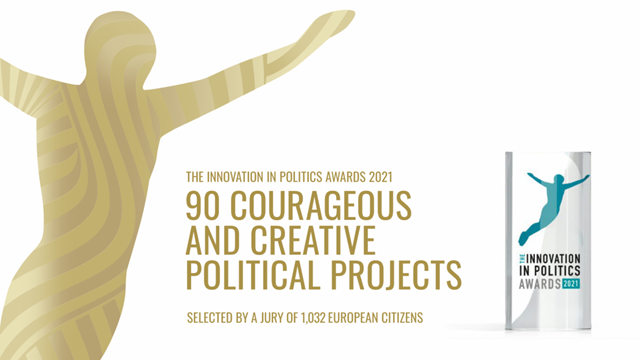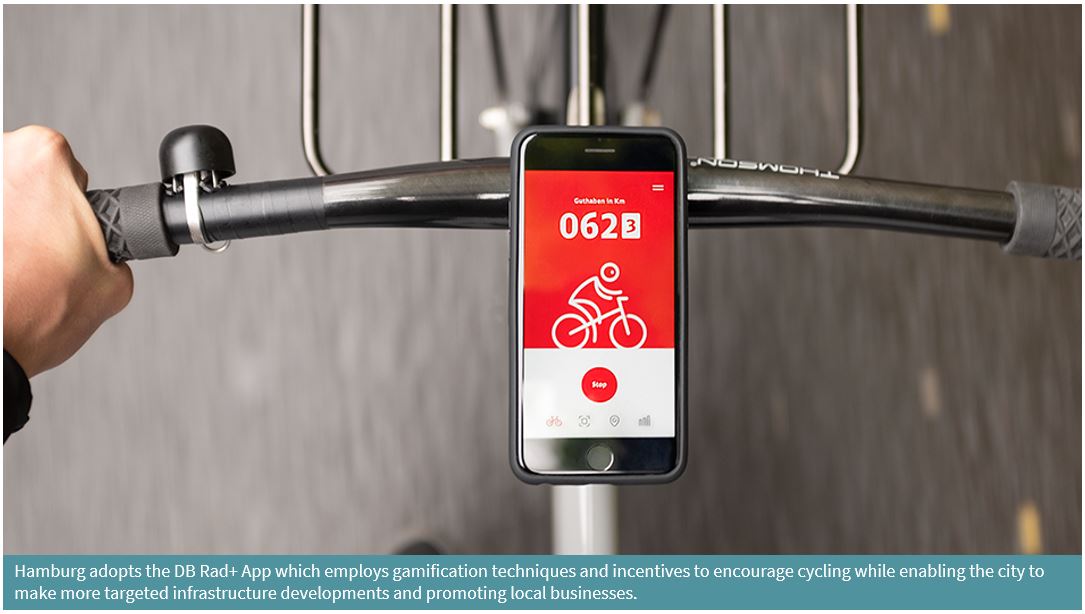
Date: 15 Oct 2021
Covid crisis and the climate crisis turn out to be strong drivers of change
Since 2017, The Innovation in Politics Awards have honoured 598 people who are at the forefront of political innovation. With this Award, The Innovation in Politics Institute gives visibility to the best political minds in Europe, provides them with a platform to present their innovative projects, and facilitates best practice exchange across borders.
Earlier this year, 413 projects were submitted by politicians from across democratic party lines from 25 European countries and a jury of 1,032 European citizens have selected the 90 finalists. Five local and national projects from Ireland have reached the final - SHE – See Her Elected, Mayo County Council, Meath County Council, and Longford County Council are among 90 European entries. With 25 European countries represented, Ireland’s entries secured finalist positions in the community, democracy, economy, and quality of life categories.
The Covid crisis and the climate crisis turn out to be strong drivers of change in political work. The full list of 90 projects can be found HERE but an overview of some of the climate actions projects are provided below.
Germany: DB RAD+ APP – Rewards for Cycling
Hamburg adopts the DB Rad+ App which employs gamification techniques and incentives to encourage cycling while enabling the city to make more targeted infrastructure developments and promoting local businesses.
Efforts have been made to make cycling more attractive in Hamburg, Germany where cyclists are rewarded for travelling on bikes. The App records the number of kilometers cycled within two districts of Hamburg (Bergedorf and Harburg) which can then be exchanged for rewards at local stores, such as a coffee or bakery. On average, one week of commuting to a local train station by bike is enough to get one free coffee. Thus, in addition to shifting the focus to climate-friendly mobility, this initiative also promotes local businesses in the city. It’s a win-win for everyone!
Moreover, the cycling data, which is collected under strict data-protection regulations, helps the city to gain a better understanding of cycling and serves as a basis for decision-making in urban planning. For example, it is now possible to identify the most cycled routes for infrastructure development.
Find out more about this project HERE.

France: Citizens’ Convention on Climate
A representative panel of French citizens work together to define measures which will help achieve a 40% reduction in greenhouse gas emissions by 2030.
This gives citizens a voice in the global fight against climate change. 150 individuals aged between 16 and 80 were randomly selected to serve as members of the Citizens Convention on Climate. This showcases the diversity of the French public voice. Participants work with several stakeholders and experts in the topics discussed, including lawyers who help them translate into legal terms the measures they want to enforce. Specialists in citizen dialogue guide these exchanges, without influencing them: the floor is left to the citizens. Most of the activities carried out by the panel focus on the immediate climate emergency.
Find out more about this project HERE.
Germany: Klimakommune Saerbeck – A city on it’s way to a sustainable future.
A community thinks globally and acts locally to create sustainable changes and social transformation for a climate-friendly future.
Energy transition, climate protection and climate adaptation in practice are core beliefs of the community of Saerbeck in Germany. The city is determined to reach a sustainable and climate-friendly future. By 2030, the 7,200 inhabitants' vision is to have fully switched to renewable energies. The Klimakommune is a model for sustainable change, social transformation and technical innovation. This demonstrates that the global challenge of climate begins at a local level.
The main project to accomplish the climate protection goals is the BioEnergyParc, which was built on the grounds of a former German army ammunition camp. The BioEnergyParc is a community project and was established with the investment of €70 million from local stakeholders.
Saerback has managed to cut its carbon footprint in half within the last 5 years. Additionally, more than 150 projects have resulted in a climate-friendly energy supply, improved biodiversity, local added value and new jobs in the community.
Find out more about this project HERE.
Netherlands: Resilience Network of Smart, Innovative, Climate-Adaptive Rooftops.
Smart blue-green roof technology mitigates the effects of extreme weather events while increasing biodiversity and protecting the most vulnerable in society from environmental pressures.
Amsterdam increasingly faces periods of heat and drought, causing heat-stress, wood rot and building damage because of a decrease in the groundwater level. Simultaneously, more extreme rain results in surface-water flooding and the overflow of sewer systems. RESILIO addresses critical urban climate challenges related to flooding, heat and water supply, energy consumption and urban livability by repurposing the rooftops of four climate-vulnerable neighbourhoods in Amsterdam.
Launched in 2018, the project is on target to install 10,000 sqm of smart blue-green roofs. Water can be stored in a buffer layer on these roofs, which reduces the impact of damage to houses and their surroundings in scenarios of heavy rainfall. The roofs have a 'smart flow control' system that anticipates heavy rain or drought by releasing or retaining water accordingly. These roofs assist climate action by reducing the impact of heavy rain, drought and the urban heat island effect, while improving building insulation, biodiversity and quality of life.
Find out more about this project HERE.
.JPG.aspx)
United Kingdom: The CANN Project – Collaborative Action for the Natura Network
A cross-border environmental project improves the condition of special areas of conservation, resulting in cleaner water, reduced flood risk and increased biodiversity and carbon capture.
The project covers the regions of Northern Ireland, Ireland and Scotland allowing the region to meet key EU biodiversity targets and secure the future of important habitats and species. habitats and species. With €9.4 million euros of funding, the CANN project team will produce Conservation Action Plans for a range of sites across the jurisdictions which are designated as Special Areas of Conservation (SACs) and accumulatively account for over 25,000 hectares of land.
Stakeholders consist of leading government departments, local authorities, research institutions and charities from across the three jurisdictions, the CANN project team will work together with local communities and stakeholders towards a shared ambition of improving the environmental condition of these SACs. This includes delivering educational programmes and consequently raising awareness of the significance of the habitats and species found on the sites, with the aspiration of protecting the conservation of these key sites and ensuring their sustainability beyond 2021 and the lifespan of the CANN project.
Find out more about this project HERE.
Sweden: Fossil-free Steel – First Industrial Scale Demonstration Site.
The first fossil-free steel, industrial-scale demonstration plant will transform Sweden's steel and iron industry and facilitate the transition to a fossil-free society: in Sweden and globally.
Gällivare, in northern Sweden is home to nearly 18,000 people, however, have suffered from a lack of employment and future perspectives. HYBRIT's industrial-scale demonstration plant is a unique project that will fundamentally change the Swedish iron and steel industry by producing the first fossil-free steel. The plant will also create thousands of new jobs over the next few years.
This project combines a progressive climate policy with high ambitions for employment, business and welfare policy. HYBRIT builds on pioneering innovations using new, not yet industrially tested, technology to produce steel with hydrogen instead of coal. HYBRIT provides a research and development platform to cooperate and develop optimal conditions for fossil-free steel.
This new technology has the potential to reduce Sweden's total carbon dioxide emissions by at least 10% and may, eventually, lead to reduced emissions from iron and steel production globally. This represents a huge step in the transition from a fossil-fuel dependent society towards a fossil-free society.
Find out more about this project HERE.